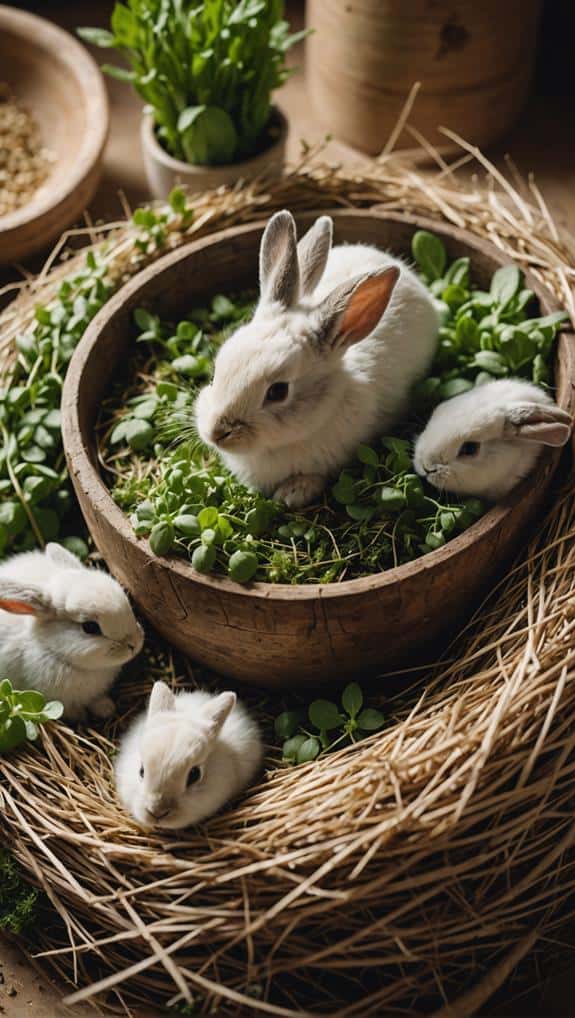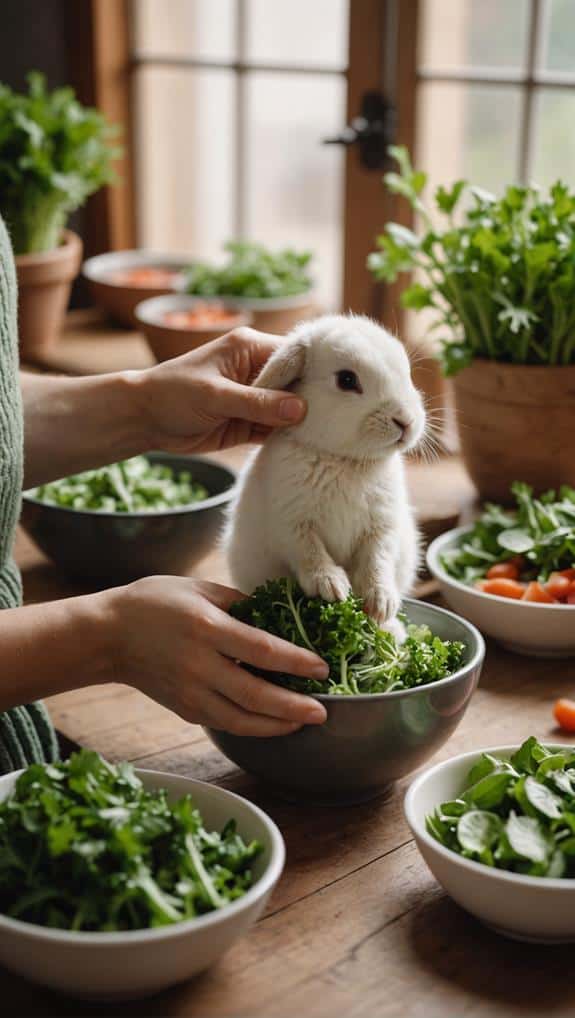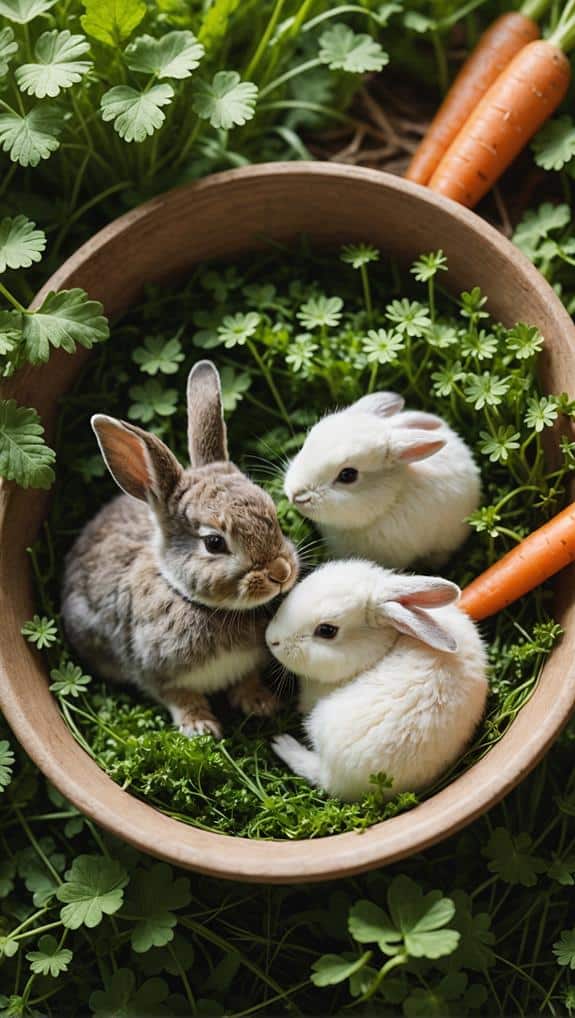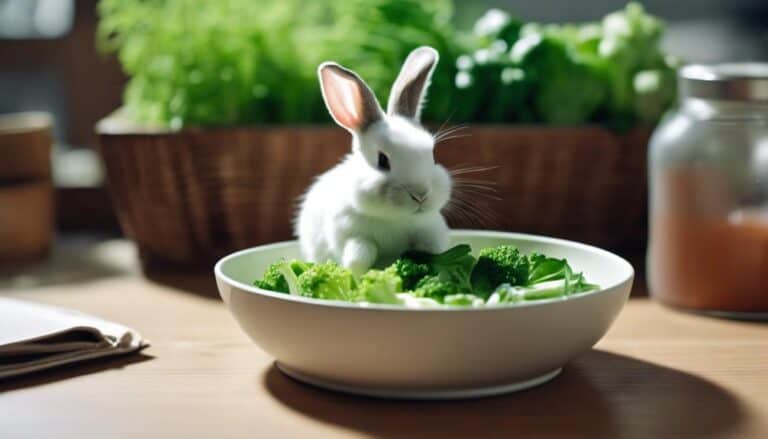When you bring home newborn bunnies, understanding their nutritional needs is essential for their health. Initially, their diet relies heavily on their mother's milk, but as they grow, they'll start exploring solid foods around two to three weeks. You might wonder how to properly introduce these first foods without upsetting their delicate stomachs. Plus, knowing when to introduce cecotropes and fresh water can make all the difference in their development. There's more to take into account, so let's explore the best practices for ensuring your tiny kits thrive during this critical stage.
Contents
Nutritional Needs at Birth

At birth, newborn bunnies, or kits, depend solely on their mother's milk for nourishment. This milk is rich in essential nutrients and antibodies, significant for their early development.
You'll notice that the first signs of nursing occur when the kits are about 24 to 48 hours old. The mother rabbit usually nurses them once a day, typically in the evening, making this a critical time for the babies to receive the nourishment they need.
Monitoring and observation of their feeding behavior is essential during this period to guarantee they're getting enough milk.
During the initial weeks, the kits' digestive system is still developing, which is why they rely entirely on milk. After about ten days, the mother provides additional key nutrients through cecotropes, which the kits consume directly. This process helps establish healthy gut flora, further supporting their growth.
If you find yourself caring for orphaned kits, using a high-protein milk replacer, such as goat milk or a specialized kitten formula, becomes indispensable. This substitute guarantees that the kits receive the necessary nutrients for survival and healthy growth.
Understand the significance of these early nutritional needs, and you'll play a significant role in their development during these formative weeks.
First Foods for Kits
In the first few weeks of life, your newborn bunny kits depend entirely on their mother's milk for essential nutrients. The nursing sessions are brief yet essential, typically lasting just 5-10 minutes, but they provide the necessary nourishment for healthy growth.
As they grow, you'll notice them starting to nibble on hay around 2-3 weeks, marking their shift to solid foods.
Additionally, cecotropes produced by their mother are essential for their digestion and overall health during this early stage, as they help provide important nutrients and promote gut health vital nourishment.
Mother's Milk Importance
Although newborn bunnies can seem fragile, their survival heavily relies on the essential nutrients and antibodies found in their mother's milk. This milk is a critical source of nutrition during the first few weeks of life, providing everything kits need to grow strong and healthy.
Typically, kits nurse just once a day, usually in the evening, which is enough to meet their nutritional requirements during this pivotal period.
As the litter size increases, the mother's milk production also rises; however, each kit may receive less milk in larger litters. After about ten days, the significance of cecotropes comes into play. These special droppings are packed with essential nutrients that help support the kits' digestive health.
If nursing from the mother isn't possible, consider alternatives like goat milk or a homemade formula designed to replicate the nutritional profile of mother's milk.
Ensuring that your newborn bunnies get these crucial components is essential for their development. By prioritizing their access to quality nutrition, you're helping them thrive during these formative weeks.
Transitioning to Solid Foods
Around four weeks old, your baby bunnies will start their exciting journey into solid foods. This shift is essential as they gradually incorporate hay and pellets while still relying on their mother's milk. It's important to recognize that pair bonding dynamics can influence their social interactions during this time, as they may establish hierarchies among siblings.
Begin by introducing small amounts of high-quality pellets and fresh hay, ensuring they've the nutrients needed for healthy growth successful pair bonding dynamics.
At around seven weeks, you can start offering alfalfa hay, which provides necessary protein and nutrients. As your kits mature, gradually switch to grass hay like Timothy or Meadow hay.
By ten weeks, it's time to introduce fresh greens and vegetables. Start with safe options like dandelion greens and basil, feeding in small quantities to prevent digestive distress.
During this shift to solid foods, keep an eye on your bunnies' fecal output. Healthy adult rabbit feces can help promote gut flora development, which is essential for digestion.
Role of Cecotropes
Cecotropes play an essential role in the nutrition of developing kits, serving as their first foods that bridge the gap from milk to solid diets. These nutrient-rich cecal droppings are packed with essential vitamins, protein, and beneficial microbes important for healthy digestion and growth.
Additionally, the introduction of safe chew toys can complement the nurturing environment needed for kits as they explore their surroundings. Typically consumed directly from their mother, cecotropes help establish the gut flora necessary for a smooth changeover to solid foods.
For orphaned kits, introducing cecotropes around day 10 can be life-changing, boosting their survival rate from 30% to an impressive 70%. The important B and K vitamins, fiber, and minerals found in cecotropes are indispensable for the well-being of nursing kits.
If your kits aren't eating cecotropes on their own, don't worry. You can introduce them through a formula or enhance their nutrition with high-quality probiotic products to support gut health.
Incorporating cecotropes into your kits' diet guarantees they receive the nutrients they need during this significant developmental phase. By prioritizing their access to these first foods, you're setting them up for a healthier adjustment to solid foods and a thriving future.
Hand Feeding Techniques

Providing proper nutrition through hand feeding is essential for the health and survival of newborn bunny kits. You’ll need to feed them twice a day, allowing 12 hours between sessions. Prepare a specially formulated milk formula using 2% milk, egg yolk, powdered milk, syrup, and bone meal to meet their nutritional needs. It’s important to monitor their weight regularly to ensure they are gaining appropriately, as this is a strong indicator of their health. When considering what to feed a young rabbit, remember that they need nutrients that support their rapid growth and development, so avoid any unsuitable foods. Always consult with a veterinarian to ensure you are providing the best possible care and nutrition for your newborn bunny kits.
While hand feeding, always hold the kits upright to prevent aspiration and carefully monitor the amount you feed them. Adjust the quantity based on the baby bunny's tummy size to avoid overfeeding.
After each feeding, gently stimulate urination and defecation by rubbing the kit's abdomen. This helps support healthy intestinal function and guarantees they're processing the milk properly.
Hygiene is vital, so clean and sanitize all feeding tools after each use to prevent any risk of infection or illness in these vulnerable kits.
If the mother rabbit is absent, consider providing cecotropes or a high-quality probiotic. This can greatly enhance their digestion and survival rate, boosting it from 30% to 70% when included in their diet.
Your commitment to their care will make a world of difference for these tiny lives.
Importance of Cecotropes
Understanding the importance of cecotropes is essential for the health of newborn bunnies.
These nutrient-dense droppings are a powerhouse of essential nutrients, including proteins, B and K vitamins, and beneficial microbes that support digestion and gut health in kits.
Around 10 days old, your newborn bunnies will start consuming cecotropes, which helps establish the gut microflora necessary for their shift from milk to solid food.
The role of cecotropes is particularly important for orphaned bunnies, as their consumption can greatly boost survival rates from 30% to 70%.
This increase is largely due to the essential fatty acids and enzymes found in cecotropes, all of which are fundamental for the proper development of baby rabbits' digestive systems.
If cecotropes aren't available for any reason, consider providing prebiotics or high-quality probiotic supplements to promote healthy gut flora and digestion in your orphaned kits.
Ensuring that your newborn bunnies receive these essential nutrients will give them a strong start in life, enhancing their overall health and well-being.
You're fostering a nurturing environment for these tiny lives, and every effort counts.
Transitioning to Solid Foods

Around 2-3 weeks of age, you'll notice your baby bunnies starting to explore solid foods, marking an exciting change in their development. This is a good time to begin shifting to solid foods, as their curiosity will lead them to nibble on hay. By 6 weeks, they'll rely more on hay, which is essential for their digestive health.
As your bunnies grow, they'll be weaned between 6-8 weeks. At this stage, you can introduce eating pellets specifically formulated for young rabbits, guaranteeing they receive vital nutrients. Alongside pellets, fresh foods like basil and dandelion greens can be introduced slowly. It's important to limit the types of greens initially to avoid any digestive distress.
At around 7 weeks, you should provide unlimited access to alfalfa hay due to its protein-rich content, but shift gradually to Timothy or Meadow hay later to prevent long-term health issues.
Throughout this process, closely monitor your bunnies' reactions to their new diet. Address any signs of digestive issues promptly to guarantee their healthy growth and development. Your attentive care during this essential phase will set the foundation for their lifelong health.
Hydration and Water Needs
As your baby bunny grows, it'll start drinking water around 3 to 4 weeks of age.
Ensuring access to fresh, clean water is vital during this change, as it supports their hydration and overall health.
Keep an eye on their water intake to prevent dehydration, especially as their diet shifts from milk to hay and greens.
Water Intake Timing
Providing proper hydration is essential for newborn bunnies, especially during their shift from a milk-based diet to solid foods. Baby rabbits typically start drinking water around 3-4 weeks of age, coinciding with their change to dry hay.
As they incorporate more dry materials into their diet, their water intake will naturally increase. It's essential to ascertain they've regular access to fresh, clean water to help them hydrate effectively.
During this weaning phase, be vigilant about monitoring their water consumption, as dehydration poses a significant risk. The dry hay they consume requires more hydration than fresh leafy greens, making it important to provide ample water.
Constant access to water not only supports their overall health but also alleviates stress during dietary changes.
Consider placing a shallow dish or a water bottle within easy reach, so your little ones can drink freely.
By prioritizing their hydration needs, you'll help your baby bunnies thrive as they adapt to new foods.
Importance of Clean Water
Ensuring your baby bunnies have access to clean water is essential for their health and well-being. Around 3-4 weeks old, these tiny kits start drinking water as they change from a milk-based diet to solid foods like hay and leafy greens.
As they make this shift, you'll notice their water intake increasing. It's imperative to provide fresh, clean water at all times, especially during these diet changes, as dry hay requires more hydration compared to fresh greens.
Without sufficient hydration, your baby bunnies can face dehydration and related health issues, so keeping an eye on their water consumption is critical.
Introduce water gradually, ensuring it's readily available as their dietary needs evolve. This not only supports their growing bodies but also promotes overall well-being.
Best Practices for Care

From the moment they're born, newborn bunny kits rely heavily on their mother's milk for essential nutrients. If the mother isn't present, you can introduce high-quality goat milk, like Meyenberg, or a specially formulated kitten milk replacer. This guarantees the kits receive proper hydration and nutrition.
As they grow, keep an eye on their development and comfort. Here are some best practices for their care:
- Offer warmth during feeding to mimic the mother's nurturing touch.
- Introduce their mother's cecotropes after about 10 days; these are essential for gut health.
- Gradually shift to solid food around 6-8 weeks with high-fiber hay and age-appropriate pellets.
- Always provide unlimited access to fresh hay, as it's important for their digestion.
Throughout this process, monitor the kits closely for signs of dehydration or distress.
Creating a warm, safe environment will help them thrive as they make the shift to solid food. Your attentive care during these early weeks is significant for their growth and well-being, and it'll set the foundation for a healthy, happy bunny life.
Final Thoughts
Caring for newborn bunnies is like nurturing delicate flowers; they need the right nutrients and care to thrive. As you guide your kits through their early days, remember to provide their mother's milk, introduce solid foods gradually, and guarantee hydration. By understanding their nutritional journey, you'll help them flourish into healthy rabbits. With your attentive care, those tiny kits will bloom into vibrant companions, bringing joy to your life as they grow.






